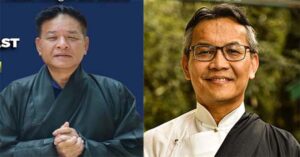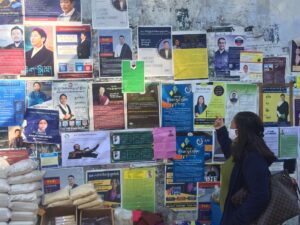
Sikyong Candidates: Penpa Tsering (left) and Aukatsang Kelsang Dorjee (Kaydor)
April 11 will see Tibetans across the world voting in the final elections for the offices of Sikyong and members of the Tibetan Parliament-in-exile. The campaigns will end on April 8; three days later voting will take place from 8 am to 5 pm. Exiled Tibetans spread across 26 countries in the world will cast their votes and the results will be declared on May 14.
This general election is the third direct election of the Tibetan leadership since the complete devolution of political authority by His Holiness the Dalai Lama in 2011.
There are two candidates for Sikyong, or President of the Tibetan Parliament-in-exile: Penpa Tsering and Aukatsang Kelsang Dorjee (Kaydor), having won the most votes in the preliminary election held January 3. A total of about 60,000 exiled Tibetans cast their votes in the preliminary elections, which also chose candidates for the 45 members of the Tibetan Parliament-in-exile.
Kaydor has been the Special Advisor to Sikyong, Representative of His Holiness the Dalai Lama to North America, Chief Resilience Officer of the Central Tibetan Administration (CTA) and the Director of the Social and Resource Development Fund. He has campaigned on the importance of “entrepreneurship,” and calls for establishing public-private partnerships. “Let’s build a dynamic and efficient CTA with a focus on strengthening the Tibetan freedom struggle, transforming education, revitalising Tibetan language, culture and empowering the youth,” Kaydor said in a campaign speech made on March 22. He continued, calling for change: “The freedom struggle should be steered away from the abyss of a frozen conflict by creating more pain points and incentives for the CCP leadership to address the Tibet issue. The CTA must become a transnational entity that is dynamic, forward-looking and which strengthens the bond between all Tibetans.”
Former Speaker of the Tibetan Parliament-in-exile Penpa Tsering, the front runner in the first round of elections, calls for providing meaningful education to Tibetan youth and improving the financial condition of the CTA and the Tibetan people. He served as Executive Director at the Tibetan Parliamentary and Research Centre in New Delhi from 2001-2008. Pempa was elected to the 12th and 13th Tibetan Parliament-in-exile and became Speaker of the House of the 14th Tibetan Parliament-in-exile in 2008; he was re-elected the following term. He was appointed to be the North America Representative of the Dalai Lama in 2016 for a year. He stood for Sikyong in the last elections, and finished as runner up to the outgoing Sikyong, Lobsang Sangay.

Campaign posters of candidates of Sikyong and Parliament members
Photo: Tenzin Samten / Contact
Final candidates for the offices of Parliament are those who received the most votes in the preliminary election of January 3. Those who win the most votes in the final election will represent the three traditional provinces: Dotoe, Domey and U-Tsang. Each province will have ten representatives. There will also be two representatives each for the five religious constituencies, two seats for representatives of Tibetans living in the Americas, two seats for Tibetans living in Europe and South Africa, and a single seat for Tibetans living in Australasia.




 Print
Print Email
Email